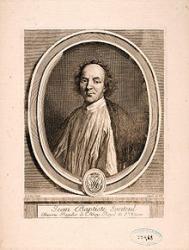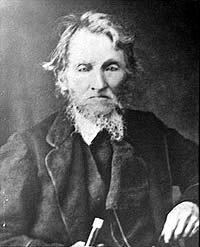Planning worship?
Check out our sister site, ZeteoSearch.org,
for 20+ additional resources related to your search.
- |
User Links
Person Results
Jane Parker Huber
1926 - 2008 Author of "O God, whom we praise from morning till night" in A Singing Faith
Jane Parker Huber
Edward C. Bairstow

1874 - 1946 Harmonizer of "HANOVER" in The United Methodist Hymnal Music Supplement II
Edward C. Bairstow
Jean-Baptiste de Santeul

1630 - 1697 Person Name: De Santeuil Author of "Disposer supreme" in Hymns Santeüil, Jean-Baptiste de, was born in Paris of a good family on May 12, 1630. He was one of the regular Canons of St. Victor, at Paris, and, under the name of Santolius Victorinus, was distinguished as a writer of Latin poetry. Many of his hymns appeared in the Cluniac Breviary 1686, and the Paris Breviaries 1680 and 1736, and several have been translated into English, and are in common use in Great Britain and America. He was very jocose in disposition and singular in his habits. When on a journey he died at Dijon, Aug. 5, 1697. His Hymni Sacri et Novi were published at Paris in 1689, and again, enlarged, in 1698. [George Arthur Crawford, M.A.]
--John Julian, Dictionary of Hymnology (1907)
Jean-Baptiste de Santeul
João Wilson Faustini
1931 - 2023 Person Name: J. Costa Translator of "Vós, servos de Deus" in Mil Vozes para Celebrar b. 1931, Bariri, São Paulo, Brazil. Presbyterian pastor, choir director, organist, singer, composer, translator, arranger and publisher of largest collection of Sacred Music in the Portuguese language. From 1982 to 1996 - Pastor at St. Paul's Presbyterian Church (PCUSA) Newark, NJ St. Paul's Presbyterian Church in Newark is the oldest Brazilian Presbyterian Church in the USA. Retired on December 31, 1996. After Rev. Faustini was a Minister of Music at Second Presbyterian Church of Elizabeth.
[Source?]
João Wilson Faustini
Leland Bryant Ross
b. 1954 Person Name: ROS' Haruo Translator, vv. 3a, 7 of "Adoru ni nun la Reĝon de glor'" in TTT-Himnaro Cigneta American Baptist layman. Amateur hymnologist and polyglot. Translator of many hymns into, and author of a few in, Esperanto, as well as some hymns in English. 13 texts (incl. 3 original) in Adoru, plus two in Espero Katolika's supplement. Edited the largest online Esperanto hymnal, TTT-Himnaro Cigneta, now accessible via the Wayback Machine at archive.org, (https://web.archive.org/web/20091021113553/http://geocities.com/cigneto/pretaj.html) as well as in large part here on Hymnary.org. Lives near Seattle.
Leland Bryant Ross
Herman H. Brueckner
1866 - 1942 Person Name: H. Brueckner Translator of "Go Joyfully Forth" in American Lutheran Hymnal Born: March 11, 1866, Grundy County, Iowa (birth name: Herman Heinrich Moritz Brueckner).
Died: January 25, 1942, Hebron, Nebraska (funeral held in Beatrice, Nebraska).
Buried: St. Paul’s Lutheran Cemetery, Waverly, Iowa.
After ordination in 1888, Brueckner pastored in Illinois, Michigan, Kentucky, and Wisconsin. He later moved to Iowa City, Iowa, and received his Bachelor of Arts degree from Iowa State University in 1917. In 1926, he joined the faculty of Hebron College in Nebraska. In 1938, Wartburg Seminary, Dubuque, Iowa, conferred an honorary Doctor of Divinity degree on him. He retired as professor emeritus from Hebron College in 1941.
Sources:
Erickson, p. 254
Findagrave, accessed 14 Nov 2016
Hustad, p. 213
Stulken, p. 325
© The Cyber Hymnal™. Used by permission. (www.hymntime.com)
Herman H. Brueckner
Erwin Kleine
Translator (German of "O worship the King, all glorious above" in Cantate Domino
Erwin Kleine
John Wesley

1703 - 1791 Author of "Great Shepherd of Souls" in Discipleship Ministries Collection John Wesley, the son of Samuel, and brother of Charles Wesley, was born at Epworth, June 17, 1703. He was educated at the Charterhouse, London, and at Christ Church, Oxford. He became a Fellow of Lincoln College, Oxford, and graduated M.A. in 1726. At Oxford, he was one of the small band consisting of George Whitefield, Hames Hervey, Charles Wesley, and a few others, who were even then known for their piety; they were deridingly called "Methodists." After his ordination he went, in 1735, on a mission to Georgia. The mission was not successful, and he returned to England in 1738. From that time, his life was one of great labour, preaching the Gospel, and publishing his commentaries and other theological works. He died in London, in 1791, in his eighty-eighth year. His prose works are very numerous, but he did not write many useful hymns. It is to him, however, and not to his brother Charles, that we are indebted for the translations from the German.
--Annotations of the Hymnal, Charles Hutchins, M.A., 1872
======================
John Wesley, M.A., was born at Epworth Rectory in 1703, and, like the rest of the family, received his early education from his mother. He narrowly escaped perishing in the fire which destroyed the rectory house in 1709, and his deliverance made a life-long impression upon him. In 1714 he was nominated on the foundation of Charterhouse by his father's patron, the Duke of Buckingham, and remained at that school until 1720, when he went up, with a scholarship, from Charterhouse to Christ Church, Oxford. Having taken his degree, he received Holy Orders from the Bishop of Oxford (Dr. Potter) in 1725. In 1726 he was elected Fellow of Lincoln College, and remained at Oxford until 1727, when he returned into Lincolnshire to assist his father as curate at Epworth and Wroot. In 1729 he was summoned back to Oxford by his firm friend, Dr. Morley, Rector of Lincoln, to assist in the College tuition. There he found already established the little band of "Oxford Methodists" who immediately placed themselves under his direction. In 1735 he went, as a Missionary of the Society for the Propagation of the Gospel, to Georgia, where a new colony had been founded under the governorship of General Oglethorpe. On his voyage out he was deeply impressed with the piety and Christian courage of some German fellow travellers, Moravians. During his short ministry in Georgia he met with many discouragements, and returned home saddened and dissatisfied both with himself and his work; but in London he again fell in with the Moravians, especially with Peter Bohler; and one memorable night (May 24, 1738) he went to a meeting in Aldersgate Street, where some one was reading Luther's preface to the Epistle to the Romans. There, "About a quarter before nine, while he was describing the change which God works in the heart through faith in Christ, I felt my heart strangely warmed. I felt I did trust in Christ, Christ alone, for salvation; and an assurance was given me, that He had taken away my sins, even mine, and saved me from the law of sin and death." From that moment his future course was sealed; and for more than half a century he laboured, through evil report and good report, to spread what he believed to be the everlasting Gospel, travelling more miles, preaching more sermons, publishing more books of a practical sort, and making more converts than any man of his day, or perhaps of any day, and dying at last, March 2, 1791, in harness, at the patriarchal age of 88.
The popular conception of the division of labour between the two brothers in the Revival, is that John was the preacher, and Charles the hymnwriter. But this is not strictly accurate. On the one hand Charles was also a great preacher, second only to his brother and George Whitefield in the effects which he produced. On the other hand, John by no means relegated to Charles the exclusive task of supplying the people with their hymns. John Wesley was not the sort of man to depute any part of his work entirely to another: and this part was, in his opinion, one of vital importance. With that wonderful instinct for gauging the popular mind, which was one element in his success, he saw at once that hymns might be utilized, not only for raising the devotion, but also for instructing, and establishing the faith of his disciples. He intended the hymns to be not merely a constituent part of public worship, but also a kind of creed in verse. They were to be "a body of experimental and practical divinity." "In what other publication," he asks in his Preface to the Wesleyan Hymn Book, 1780 (Preface, Oct. 20,1779), "have you so distinct and full an account of Scriptural Christianity; such a declaration of the heights and depths of religion, speculative and practical; so strong cautions against the most plausible errors, particularly those now most prevalent; and so clear directions for making your calling and election sure; for perfecting holiness in the fear of God?" The part which he actually took in writing the hymns, it is not easy to ascertain; but it is certain that more than thirty translations from the German, French and Spanish (chiefly from the German) were exclusively his; and there are some original hymns, admittedly his composition, which are not unworthy to stand by the side of his brother's. His translations from the German especially have had a wide circulation. Although somewhat free as translations they embody the fire and energy of the originals.
It has been the common practice, however for a hundred years or more to ascribe all translations from the German to John Wesley, as he only of the two brothers knew that language; and to assign to Charles Wesley all the original hymns except such as are traceable to John Wesley through his Journals and other works.
The list of 482 original hymns by John and Charles Wesley listed in this Dictionary of Hymnology have formed an important part of Methodist hymnody and show the enormous influence of the Wesleys on the English hymnody of the nineteenth century.
-- Excerpts from John Julian, Dictionary of Hymnology (1907)
===================
See also in:
Hymn Writers of the Church
John Wesley
H. Ellis Wooldridge
1845 - 1917 Person Name: H. E. W. Arranger of "HANOVER" in Hymns b. 3/28/1845, Winchester; d. 2/13/17, London; English music scholar
LOC Name Authority File
H. Ellis Wooldridge
Lorenzo Lyons

1807 - 1886 Person Name: Laiana (Lorenzo Lyons), 1807-1886 Translator of "NA KAUWA MAIKA'I" in Na Himeni Haipule Hawaii Lorenzo Lyons also known as Makua Laiana, missionary to Hawaii.
Dianne Shapiro
Lorenzo Lyons


 My Starred Hymns
My Starred Hymns

